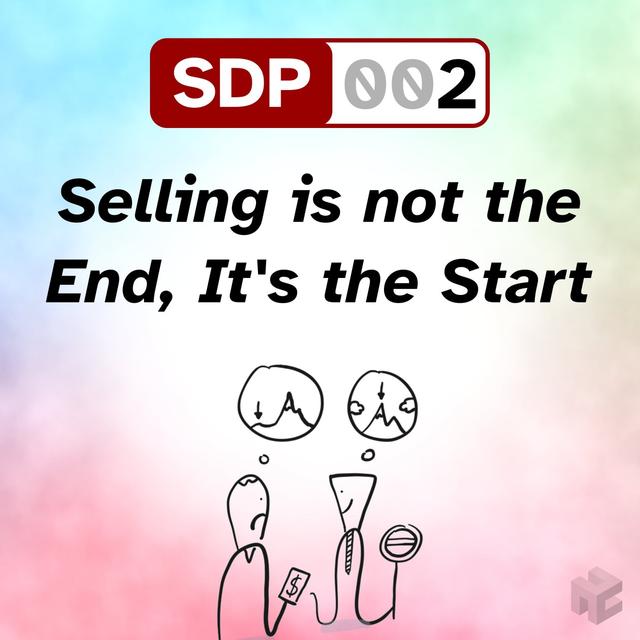¶ Open
- selling is not the end. It's the start.
¶ Welcome
Welcome to the Service Design Principles. I'm Guy Martin,joined by the author of the Service Design Principles series of books. Founder of the Swiss Innovation Academy and Service Design Practitioner, the engaging, Daniele Catalanotto.
Hi Guy, such a pleasure to be here with you today.
Same here, So each episode we're looking at one of the principles from your book, the Service Design Principles. 1 to 100 and you know, the first book in the series. And today it's the second principle. Selling is not the end, it's the start. For many salespeople, once they've had the sale, they feel their job is done and now it's up to others to deliver. So why isn't this true, Daniele?
¶ Dating and Marriage
There is this exercise that I love to do, which is bringing back what we do in business or in organizations to their everyday life. So imagine if you. You were dating. You know, and we are dating. And so basically when you're dating, you know, you go buy chocolates. You're inviting the person for drinks. You you give her flowers. You know, you say you tell her how you're lovely and beautiful she is. And once you get married you stop, you know, basically
you stop. It's like now you don't do anything. You never buy flowers again. You never tell her that she's beautiful in these skinny jeans. You know, you'd never say that. How would it feel,
Not so good.
No, And what would be the end? a divorce,
Very likely. Yep.
And so. So basically, it's bringing it back to that level where if we do this kind of exercise, you know, a relationship between organizations and people, you know, our basically relationship between people and people, that's how we think about it, you know, And therefore what would be weird it down between individuals would be weird if we do it between
organizations of people. So stopping at investing a lot only into marketing and not thinking about, oh, we have to sustain that after this relationship, then basically you're you're planning for a divorce
Right.
or a one night stand.
¶ One Night Stands in Business
Which . I mean, you can have one night stands in business senses as well. I suppose so. Maybe that's not such a big issue for those particular services, but
and I think that's that's where it's important is as long as people are clear and it's you know, it's like in relationships, you know, when you when you're dating and you're in relationships where you say, this is just fun and we're going to have a lovely night together, the expectation is clear,
Right.
you know, But when we're saying, hey, you're lovely, we're speaking about kids and stuff, and then once we've been in bed and then the next day I'm not here, that is that's a broken relationship. if it's clear that it's a one night stand and then definitely it makes sense. But I think many businesses today try to be to sell at least this idea that, oh, you're going to have a long relationship with
Yeah.
us.
So it's about setting expectations, right?
Yeah, exactly.
Yeah. So I think especially, like, you know, the one night stand business, a single purchase may maybe you're in a foreign city or something, and you go to a kiosk, a bodega, a little store just to buy a bottle of water. That's
Yeah,
that sort of one transaction that that's maybe the the whole-. Yes. The sale is the end of the journey. But for services that are based on recurring revenue things like this, where people are constantly assessing and saying, do you live up to the expectations that you've already set, then the selling is setting the expectations and the delivery of those over time. That's that's the whole journey right?
¶ Turn transactions into relationships
indeed. And even for the bodega, you know, if you go to go buy a water, if you just feel that this guy made everything that you buy the water but isn't interested in you in any way,
Mm hmm.
you know, next time you, you go next year back to that place, you definitely will not buy there because you will feel used. But if the guy sold you the thing and then just said, Hey, by the way, I've seen you, you've opened your map. There is a very cool place just to stares from
Hmm.
there. Nobody knows it. It's super great. What will you do? You go out, go down there, you come up and you go buy something new there for your kids because you said this guy is a super smart
Yeah.
guy. He was lovely.
Yeah. So that's that's really interesting. We can turn that transactional experience into something that that could last longer. Even buying a bottle of water.
And even then. But obviously it it still makes sense to say that sometimes there is no need for that.
Right.
But it doesn't mean it doesn't mean that it's always the case.
Okay . I think That's pretty clear. And this actually links into our our next principle as
¶ Outro
well, which we'll talk about in the next episode. thanks, Daniele, again, and we'll speak again then.
Thank you.

